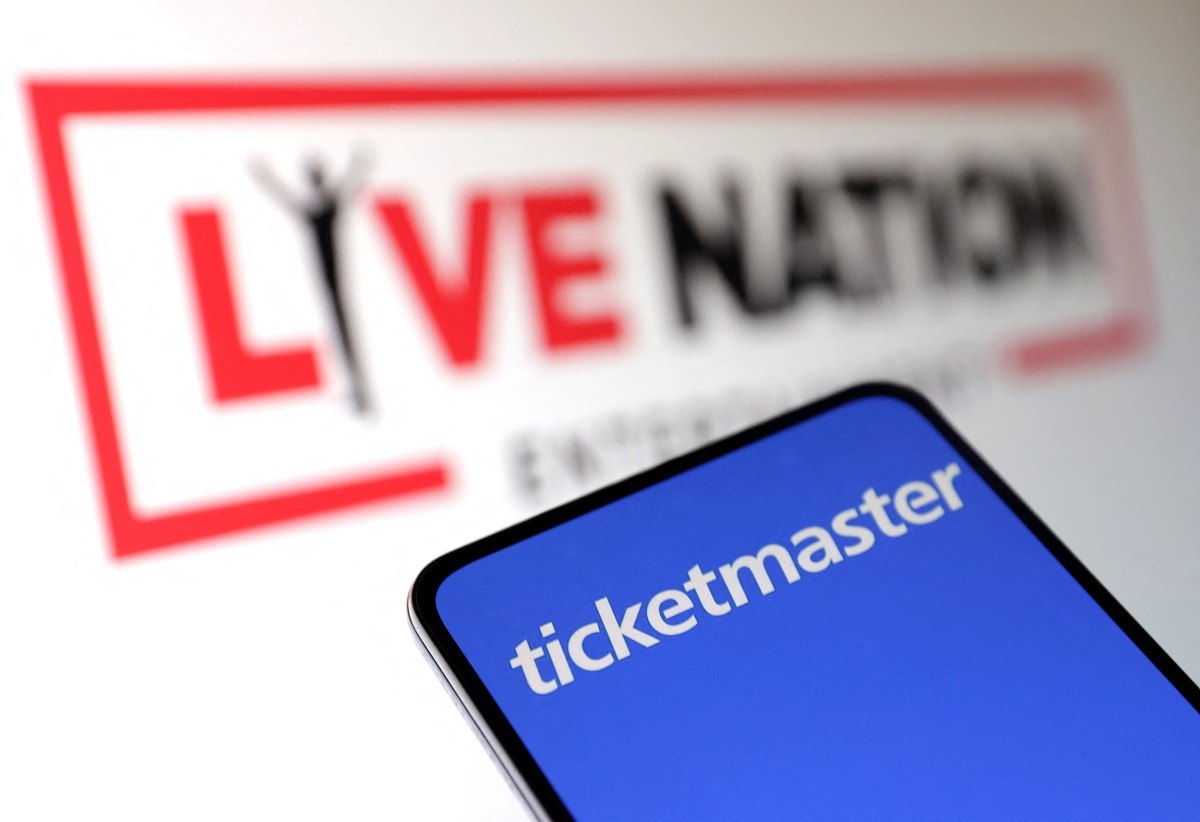
Live Nation Entertainment and Ticketmaster logos are seen in this illustration taken May 23, 2024.
17:26 JST, May 26, 2024
The U.S. government filed a sweeping antitrust lawsuit Thursday against Live Nation Entertainment, the parent company of Ticketmaster, seeking to break up the conglomerate over allegations that it has amassed and abused unrivaled power in the ticketing and concert industries.
The landmark case – joined by 30 state and district attorneys general – could dramatically reshape an ecosystem that has long sparked outrage from artists and fans alike, whose frustrations erupted in 2022 when high fees and site outages disrupted early sales for Taylor Swift’s “Eras” tour.
Live Nation is an entertainment titan: It is a concert promoter, artist manager, venue owner and ticket seller and reseller, constituting a sprawling empire that its executives publicly herald as the “largest live entertainment company in the world.” Last year alone, Live Nation produced more than 50,000 concerts and other musical events, and it sold more than 620 million tickets globally, the company boasted to investors in April.
But the U.S. government contends that the company’s vast power and reach have also afforded it unfair advantages over competitors, allowing Live Nation to evolve into an illegal and harmful “monopolist” – with the power to box out rivals, reduce consumer choices and raise ticket prices.
“It is time to break it up,” Attorney General Merrick Garland said at a news conference Thursday.
State and federal officials allege that Live Nation threatens to retaliate against performance venues unless they agree to use the company’s Ticketmaster service. Otherwise, these venue operators risk losing access to popular Live Nation-managed performances and tours – an unfavorable ultimatum, according to the government, that has allowed Ticketmaster to lock up more than 70 percent of sales at major concert venues.
To further entrench its dominance, Live Nation also targets artists: Performers at times must use Live Nation’s tour promotional services, or they cannot perform at company-operated venues, the complaint alleges. Live Nation owns or controls 265 concert venues in North America, including 60 of the top 100 amphitheaters in the United States, according to the government’s estimates.
State and federal antitrust watchdogs contend these arrangements ultimately have restricted artists, arrested the growth of competing ticketing services and imposed higher costs on audience members, who face a “Ticketmaster tax” in the form of steep and “endless” fees, charged Jonathan Kanter, who oversees antitrust for the Justice Department.
“Some monopolies are just so entrenched, and some problems so difficult to address, that they require decisive and effective solutions,” he later explained.
The complaint asks a federal judge in New York to order structural changes to Live Nation, which could effectively force the company to break up. A long, arduous court battle is now likely to follow, one that will see the Justice Department argue for unwinding a merger that the agency itself approved more than a decade ago.
In a statement Thursday, Live Nation sharply rebutted the charges that it violated anti-monopoly laws. Dan Wall, the company’s executive vice president for corporate and regulatory affairs, said the government “ignores everything that is actually responsible for higher ticket prices,” including higher production costs, artist popularity and ticket “scalping.”
“It’s also clear that we are another casualty of this administration’s decision to turn over antitrust enforcement to a populist urge that simply rejects how antitrust law works,” he added.
The lawsuit marks only the latest federal antitrust case initiated under President Biden, who came to office promising to crack down on corporate power and profiteering. Over the past three years, federal watchdogs have sued major technology companies including Apple, Amazon, Facebook and Google for allegedly anticompetitive practices, and they have blocked major mergers involving airlines, biotech firms and grocery chains.
“Maybe it took people by surprise, but the president said [the government] wanted to do something on this, and they have,” said Sen. Amy Klobuchar (D-Minn.), the top lawmaker on the chamber’s antitrust panel. She added that Washington never should have allowed Live Nation to acquire Ticketmaster in the first place.
“However you look at it,” she said, “that’s a monopoly.”
Nearly 15 years ago, it was Washington’s blessing that paved the way for Live Nation to expand its corporate footprint: The Justice Department in 2010 gave the green light for the company to purchase Ticketmaster, combining what was already the largest concert promoter with the most prominent ticketing platform.
The deal created a powerhouse that could manage every part of a performance: It could plan and execute the logistics around an artist’s tour, handle all of their initial sales through Ticketmaster and stage some of the shows at Live Nation’s own venues, including the Hollywood Palladium in Los Angeles and the Brooklyn Bowl in New York.
In a bid to preserve competition, the Obama administration approved the merger only on a conditional basis. It required Live Nation to divest some of its business lines, and it prohibited the combined company from retaliating against venues that opted to use alternative ticketing platforms. At the time, federal officials said their consent decree would pave the way “for strong competitors to Ticketmaster, allowing concert venues to have more and better choices for their ticketing needs.”
But the legally binding agreement didn’t quell broad opposition from concert venue owners and artists, who grumbled in the years to follow about the ease with which Live Nation allegedly flouted the federal restrictions. The accusations are laid bare in the government’s roughly 120-page complaint, filed Thursday in a federal court in New York.
“With this vast scope of power comes influence. Live Nation and its wholly owned subsidiary, Ticketmaster, have used that power and influence to insert themselves at the center and the edges of virtually every aspect of the live music ecosystem,” the complaint alleges. “This has given Live Nation and Ticketmaster the opportunity to freeze innovation and bend the industry to their own benefit.”
The Justice Department filed its case alongside attorneys general for Arizona, Florida, Maryland, Texas and the District of Columbia, among other jurisdictions. Rob Bonta, the Democratic attorney general of California, said that customers currently “have a terrible experience on Ticketmaster, they hate it, it’s frustrating, but its all they got because Ticketmaster has no real competition.”
The lawsuit charges that Live Nation gobbled up some of its rivals – and struck anti-competitive arrangements with others – in a bid to further solidify Ticketmaster as a dominant sales platform. The antitrust watchdogs offered the example of Oak View Group, described by the government as a “competitor-turned-partner” with which Live Nation brokered a deal to avoid competing over artists and tours they would manage. Whenever the company did try to compete for artists, Live Nation “repeatedly scolded Oak View,” Garland said Thursday.
In response, Live Nation said in a blog post that its integration had actually helped concertgoers and artists alike, since it resulted in “better prices and better services than they would receive if these complementary businesses were separated.”
The Justice Department launched its latest Live Nation investigation in 2022, two years after the agency under President Donald Trump found that the company had “repeatedly” broken its promises to antitrust enforcers. As a federal lawsuit became imminent this spring, competition experts urged the Biden administration to remedy its predecessors’ mistakes by unwinding a company that they said had leveraged its dominance to the detriment of rivals.
“It’s clear what the DOJ has tried previously … has not worked,” said Sumit Sharma, a senior researcher at Consumer Reports. “Live Nation-Ticketmaster’s market share has remained the same.”
The first word of the federal probe arrived on the heels of another fiasco – a surge of demand for Taylor Swift presale tickets in 2022 that crashed Ticketmaster and left countless fans unable to buy seats for her 2023 tour. The widely documented incident put a fresh spotlight on the company, its dominance in ticketing and the fees that it charges consumers.
Policymakers around the country soon unleashed a battery of legislative proposals meant to crack down on abuse in ticketing and better highlight the fees that customers face before they reach the checkout page. On Capitol Hill, Klobuchar summoned Joe Berchtold, the president of Live Nation, for a lengthy grilling over his company’s business practices.
“We hear people say that ticketing markets are less competitive today than they were at the time of the Live Nation-Ticketmaster merger,” Berchtold said in his testimony. “That is simply not true.”
But the company’s critics and competitors swiped at Live Nation for issuing ultimatums to concert halls and sports venues that could not afford to lose the company’s business. Jack Groetzinger, the chief executive of SeatGeek, a competing platform, said the fears of retaliation had allowed Live Nation to grow unchecked: He estimated that Ticketmaster came to amass a market share exceeding 70 percent in primary ticket sales, especially for professional basketball, hockey and football games.
“Major venues in the United States know that if they move their primary ticketing business from Ticketmaster to a competitor, they risk losing the substantial revenue they earn from Live Nation concerts,” Groetzinger said.
On Thursday, state and federal officials acknowledged SeatGeek’s competition concerns. Their lawsuit cites a 2021 incident in which Live Nation “threatened retaliation against a venue that had decided to switch from Ticketmaster to SeatGeek for primary ticketing,” according to the complaint.
Live Nation “followed through on its threats, rerouting concerts to other venues,” officials allege. The government does not name the venue in its complaint, but the details appear to align with a known previous incident involving the Barclays Center in Brooklyn, which switched vendors in 2021 and then later returned to using Ticketmaster last year.
“We believe this lawsuit will drive innovation and improve ticketing for fans – something SeatGeek has been focused on since the very beginning,” Groetzinger said in a statement Thursday. “It’s time to give fans, teams, artists and venues the choice and experiences they deserve.”
The heightened scrutiny has promoted Live Nation to scale up its political operation dramatically in recent years: The company spent $2.3 million to influence Washington policymakers in 2023, more than double the year prior, according to OpenSecrets, a money-in-politics watchdog.
Live Nation has continued its spending spree into 2024, helping to host a party around the annual White House correspondents’ dinner – a swanky performance that touted the company’s bona fides on cocktail napkins.
“We’ve seen an uptick in their lobbying spending,” acknowledged Morgan Harper, the director of policy and advocacy at the American Economic Liberties Project, a left-leaning group that has advocated for Live Nation to be broken up. “It’s not surprising an entity like Live Nation, whose business model has allowed them to engage in anti-competitive conduct, would be bringing to bear all the resources it has.”
Top Articles in News Services
-

Survey Shows False Election Info Perceived as True
-

Hong Kong Ex-Publisher Jimmy Lai’s Sentence Raises International Outcry as China Defends It
-

Japan’s Nikkei Stock Average Touches 58,000 as Yen, Jgbs Rally on Election Fallout (UPDATE 1)
-

Japan’s Nikkei Stock Average Falls as US-Iran Tensions Unsettle Investors (UPDATE 1)
-

Trump Names Former Federal Reserve Governor Warsh as the Next Fed Chair, Replacing Powell
JN ACCESS RANKING
-

Producer Behind Pop Group XG Arrested for Cocaine Possession
-

Japan PM Takaichi’s Cabinet Resigns en Masse
-

Man Infected with Measles Reportedly Dined at Restaurant in Tokyo Station
-

Israeli Ambassador to Japan Speaks about Japan’s Role in the Reconstruction of Gaza
-

Videos Plagiarized, Reposted with False Subtitles Claiming ‘Ryukyu Belongs to China’; Anti-China False Information Also Posted in Japan


























